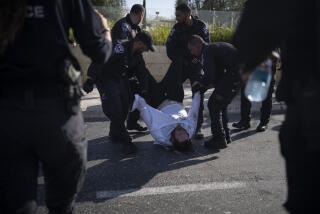No such thing as ‘Israeli nationhood,’ country’s Supreme Court says
JERUSALEM -- There is no such thing as “Israeli nationhood,” Israel’s Supreme Court has ruled, putting to an end a 40-year legal battle but leaving fundamental questions about national identity and the character of the country very much open.
The court on Wednesday rejected a petition by a group of Israelis to change the ethnic registration on their identity cards from “Jewish” to “Israeli.” Some Arab citizens joined the petition, also asking to be listed as “Israeli.”
Israel’s population ledger lists all citizens as Israeli. But under the section of leom -- a Hebrew term for nationhood or ethnicity -- state authorities automatically register Arabs as “Arab” and Jews as “Jewish.”
Wednesday’s decision upholds a decades-old court ruling that there is no proof of a uniquely Israeli people.
“What are they talking about? Of course there is,” playwright Joshua Sobol told Israeli media Thursday.
Sobol said he doesn’t reject Judaism, but as a secular person, he is defined by Israel and its culture more than by his Jewishness. He said he shares more in common with the Arab petitioners “than with a Jew in Finland or Seattle.”
Uzzi Ornan of Jerusalem, a 90-year-old linguist, had led the decades-long legal battle, arguing that the state’s automatic classifications were undemocratic and coercive.
“The Israeli nation exists, with or without the court,” he was quoted as saying after the ruling.
Judge Uzi Fogelman, who was part of the three-justice Supreme Court panel that considered the petition, wrote, “The natural place for these discussions isn’t in the courtroom, but rather in other arenas of public debate and academic writing.”
Official recognition of Israeli “nationhood” could have far-reaching implications for the country’s legal definition as a Jewish state, for its Jewish and non-Jewish citizens and for Jews around the world wanting to emigrate to Israel under the country’s Law of Return.
It could also have implications for peace negotiations with the Palestinian Authority, which Israel insists must recognize it as the national homeland of the Jewish people.
Identity cards issued since 2002 have generally left open the question of leom. The Ministry of Interior stopped filling in the category to avoid having to comply with a court order to register converts to non-Othodox streams of Judaism as “Jewish.” The ministry, which oversees the population registration process, was frequently under ultra-Orthodox Jewish control.
But the category is still filled in on the population ledger. The ministry recently decided to also allow Jews to identify themselves as such on their cards, saying that some Holocaust survivors felt strongly about stating they were part of the Jewish nation.
ALSO:
Russia evacuates personnel from Libya in wake of embassy attack
Seeking new home, at least 94 Eritreans die as boat sinks off Italy
Swarms of hornets kill 42 people, injure hundreds in northwest China
More to Read
Sign up for Essential California
The most important California stories and recommendations in your inbox every morning.
You may occasionally receive promotional content from the Los Angeles Times.










